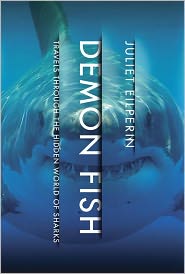 Juliet Eilperin’s “Demon Fish: Travels Through the Hidden World of Sharks” hit bookshelves earlier this week. Juliet has written many great articles about shark science and conservation for the Washington Post, where she works as a science and environment reporter, and I was excited to read Demon Fish. It did not disappoint.
Juliet Eilperin’s “Demon Fish: Travels Through the Hidden World of Sharks” hit bookshelves earlier this week. Juliet has written many great articles about shark science and conservation for the Washington Post, where she works as a science and environment reporter, and I was excited to read Demon Fish. It did not disappoint.
Category: Uncategorized
Every year high school students from across the country come together to compete against each other and test their knowledge of marine systems and processes. The National Ocean Science Bowl is soliciting applications for question writers to contribute their knowledge to the competition. If you think your ocean skills are up the task, head on … Read More “Become a question writer for the National Ocean Science Bowl” »
The 3QuarksDaily science writing contest, a prestigious online writing competition, has entered the public voting phase. One Southern Fried Science post has been nominated- Back from the Brink: Victories in Conservation (which can be viewed here) . That post, co-written by Andrew and I, tells the story of an important scientific paper that showed both … Read More “Vote for us in the 3QuarksDaily science writing contest!” »
Happy Friday Everyone! We frequently link to other important marine and general science blogs, to the extent that regular readers can probably guess which science blogs we read and how often, but science isn’t everything. We decided to take a moment to tell y’all about the non-science blogs that we enjoy.

Foucault saw the concepts of knowledge and power as one entity, which he called “pouvoir-savoir”, based on the philosophy that knowledge and power are co-evolved. There are a number of examples where Foucault’s assertion seem to be correct. In France, a group of patients with muscular dystrophy coordinated and collected vast amounts of collective data on the rare disease by detailed recordkeeping by family members. They even held their own conferences and shared information, eventually bringing in a couple of doctors to do standard medical analysis on their data. Armed with knowledge of the disease, they were able to confront the medical establishment, which had previously ignored their cases because so little was known about the disease and the doctors did not want to look ignorant. Public attention brought by these events also brought funding to an otherwise unprofitable treatment regiment (Rabeharisoa and Callon in Jasanoff 2004). In other parts of the world, knowledge of medicinal plants and other helpful plant genotypes has been linked to indigenous rights movement through intellectual property (Whatmore 2002). Plant germplasms have become a way for communities to connect to international groups supporting biodiversity, which in turn helps secure indigenous rights over both intellectual and land properties.


Two of Ostrom’s (1990) institutional design principles emphasize the role of the local –rules must be adapted to local conditions and resource users must participate in the rulemaking process. These principles were determined empirically through cross-site analysis, but a large body of research from science studies supports these finding theoretically as well. The most clear example of including the community in management is through comanagement, which works at the collective level to shift how and where rules are made (Jentoft, McCay et al. 1998). The comanagement process also highlights the importance of different types of knowledge to the policy process by providing a more complete base of information on which to make decisions.
The supporting theory reaches back to early studies in game theory that determined the fairness of a rule was one of the critical factors in determining if cooperation would emerge (Axelrod 1984). Fairness does not necessarily mean that every citizen benefits equally, but instead that people are punished according to their transgressions and benefit according to their contributions. However, the perception of fairness matters more than actual fairness when people evaluate a policy. That perception depends on transparency of the policymaking process. Gusterson goes so far as to say “instead of seeking a definitive technical judgment, then, we should ask about the processes by which judgments come to be considered definitive and their authors authoritative” (Nader 1996). People are more likely to consider a policy fair if they consider the process fair. One way, arguably the best way, to make the process transparent and therefore fair is to involve citizens in that process.
This 2011 Beneath the Waves Film Festival entry comes from Kathleen Frith of Harvard Medical School. It tells the story of a spell that has been cast on the world to make us forget the ocean, and a little girl who tries to remember.
Southern Fried Science is back online. We hope you didn’t miss us too much. If you hadn’t noticed, we had a bit of server trouble this week, but everything is back to normal. Special thanks to the tech support at BlueHost.com who were patient, professional, and exceptionally helpful walking us through the repairs.
This week’s comment of the week is in response to last week’s open thread. Mark Gibson gave a thoughtful response to the challenges of high seas governance, ending with the following strategy: End fishing subsidies at the WTO. Fishing subsidies have greatly distorted the world’s fishing capacity. By one study, the global fishing fleet needs … Read More “Comment of the Week” »
